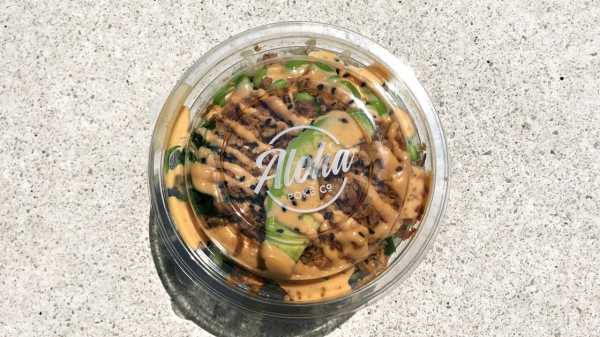 es from Using the Word “Aloha” | ” />
es from Using the Word “Aloha” | ” />
On July 28th, a Hawaiian activist named Kalamaokaaina Niheu appeared in a Facebook Live video to discuss a “disturbing message” that she had received in her in-box that morning. It was about Aloha Poke Co., a restaurant chain based in Chicago that specializes in fast-casual versions of poke, a traditional Hawaiian dish made of chunks of seasoned raw fish. Niheu, who represents Hawaii in the Pacific Caucus at the United Nations and lives in Honolulu, had been hearing from Hawaiian business owners who had received cease-and-desist letters from the Chicago company, claiming that it had trademarked the phrases “Aloha” and “Aloha Poke,” and that any food business using those words in its name was infringing on its federal trademark.
To Niheu and other kanaka maoli—native Hawaiians—Aloha Poke Co.’s claim was ludicrous: How could a business, let alone a non-Hawaiian one, claim a right to something as fundamental to Hawaiian culture as the word “aloha”? The term, which can mean “hello” and “goodbye,” also signifies a spiritual connection between the Hawaiian people and the world around them, Niheu explained. Now it was being used as “a legal, blunt hammer for profit, so that Aloha Poke Co. can compete in a market that was never theirs to begin with,” she said. Several shops had already been forced to rebrand their poke businesses, and front the cost of doing so—redesigning their logos, tossing infringing merchandise and menus, and changing their social-media handles. One restaurant owner in Anchorage, Alaska, changed her business name from Aloha Poke Stop to Lei’s Poke Stop after receiving a cease-and-desist letter. “We just weren’t prepared to do that,” she told Eater. “We were already struggling as a small family business.”
Aloha Poke Co. has owned its federal trademark for two years, but Niheu’s Facebook comments made people suddenly take notice. Her video went viral, and, rallying around the hashtags #NoAlohaPokeCo and #AlohaNotForSale, Niheu organized a petition demanding that the company take both “aloha” and “poke” out of its brand name. Kaniela Ing, a Hawaii state legislator who is running for Congress, posted a video accusing Aloha Poke Co. of failing to embody the Hawaiian value of pono, or righteousness. Some called for a boycott. In response to the outcry, Aloha Poke Co., on July 30th, posted an apology on its Facebook page, saying that it sought only to protect its trademarks, “a very common practice,” and that it had attempted to do so in a “cooperative manner.” “This really just comes down to business and protecting the Aloha Poke Co. entity,” the company’s founder, Zach Friedlander, wrote.
Friedlander founded Aloha Poke Co. in 2016 as a stall in a food market in Chicago’s upscale West Loop. A thirtysomething native of the Chicago area, he had first tried poke on a visit to Venice Beach, in Los Angeles. “Supertasty fresh flavors—like sushi in a bowl,” he told the Chicago Tribune. His stall was a hit—a Tribune food writer wrote that it had “the longest lunch line downtown”—and, in 2017, Friedlander launched an ambitious expansion plan, opening franchises in cities like Milwaukee, Minneapolis, and Washington, D.C., with nine locations in the Chicago area alone. In April, Friedlander was replaced by a new C.E.O., Chris Birkinshaw, a former executive at the Potbelly sandwich chain.
Hawaiian poke traditionally consists of cubes of fish mixed with sea salt, seaweed, and inamona, a ground component of the kukui nut. In Hawaii, it originated as a snack consumed on fishing trips and has since become a ubiquitous national dish, available pre-seasoned in gas stations and grocery stores with proteins like marlin, cured octopus, and raw beef liver. “Poke is like pizza,” a Honolulu shop owner told the Chicago Sun-Times. “There’s a million poke shops out here.”
On the mainland, the dish has morphed into something more like Pinkberry 2.0, entrancing fitness buffs and office drones as a fish-forward version of a grain bowl, with ahi tuna, salmon, or tofu served over sushi rice or “zoodles” (zucchini noodles) and made customizable with a variety of toppings and sauces. Mainland poke chains often trade in stereotypical Hawaiian imagery—hula dancers, surfboards, shaka signs—and tend to use ingredients that have little to do with the traditional Hawaiian preparation: mango, asparagus, pineapple, or, at Aloha Poke Co., yuzu ranch dressing. (“Honestly, the poke is really frightening in other places,” Niheu said in her Facebook video.) In 2017, Business Insider called poke the “next phenomenon in fast-casual food.”
As the Times’ Ligaya Mishan, a Hawaii native, wrote earlier this year, there is no “ ‘true’ poke. There isn’t one; grocery stores in Hawaii offer as many as four dozen varieties.” “Authenticity” is a tricky concept when it comes to food; as poke is popularized on the mainland, far from its origins, it is bound to be made and transformed by non-Hawaiian chefs. In its apology on Facebook, Aloha Poke Co. wrote that it intended merely to “celebrate Hawaiian culture and what makes it so wonderful.” But the brand’s corporate strong-arming has struck many observers as the most blatant kind of cultural appropriation—an effort not to celebrate another tradition but to own it.
For many native Hawaiians, Aloha Poke Co.’s actions also have a bitter resonance with their broader struggles to preserve their cultural autonomy within the United States, which some islanders still see as an occupying force. Modern-day Hawaii has the nation’s highest rate of homelessness, while resorts exercise de-facto ownership over bigger and bigger tracts of property on the islands. As Niheu pointed out in her petition, Hawaiians, for nearly a century, until 1987, were forbidden from using their native language in schools. To have a mainland corporation trademark native Hawaiians’ own words, in 2018, feels like more of the same silencing, but with an ironic twist: this time, their language is something to be commodified rather than erased.
Aloha Poke Co. has so far not offered any indication that it plans to give up its trademark, but, as of Thursday, Niheu’s petition had garnered more than a hundred and fifty thousand signatures. She and her supporters are planning a rally with American indigenous allies at the company’s headquarters on Friday, and in front of store locations in downtown Chicago and in Lincoln Park in the following days. “Aloha Poke Co. has no idea what they started,” Niheu told Eater. “People talk about poking a bear? Well, they just poked the Hawaiian shark.”
Sourse: newyorker.com






